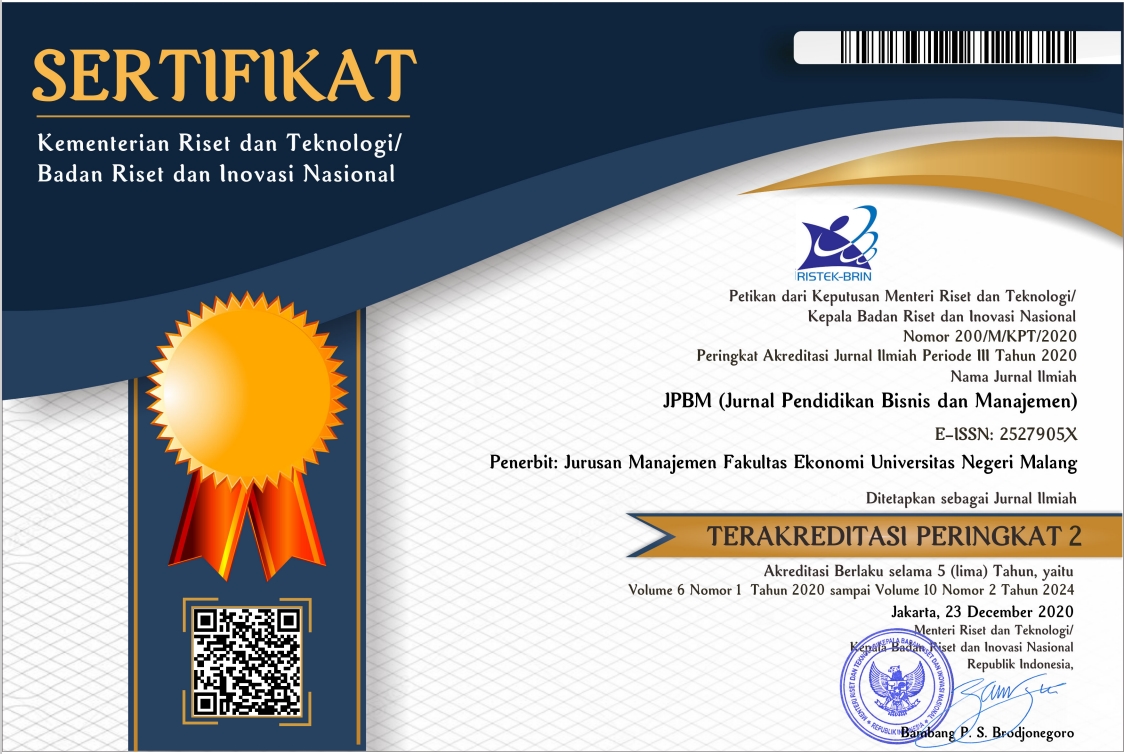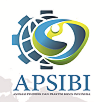Improve Correspondence Learning Outcomes and Problem-Solving Capabilities by Developing Problem Based Learning Modules
Abstract
Keywords
Full Text:
PDFReferences
Berry, T. 2008., Pre-Test Assessment. American Journal of Business Education, 1(1), 19–22.
Bible, L., Simkin, M. G., & Kuechler, W. L. 2008. Using Multiple-Choice Tests to Evaluate Students’ Understanding of Accounting. Accounting Education: An International Journal, 17(0), 55–68. https://doi.org/10.1080/09639280802009249
Busingnye, J. D. & Najjuma, R. 2015. Do Learning and Teaching Materials Influence Learning Outcomes Amidst High Enrolments? Lessons From Uganda’s Universal Primary Education. Africa Education Review, 12(1), 109–126.
Coughlin, P. A., & Featherstone, C. R. 2017. How to Write a High Quality Multiple Choice Question (MCQ): A Guide for Clinicians. European Journal of Vascular and Endovascular Surgery, 1–5. https://doi.org/10.1016/j.ejvs.2017.07.012
Gholami, M., Moghadam, P.K., Mohammadipoor, F., Tarahi, M.J., Sak, M., Toulabi, T., Pour, A.H.H. 2016. Comparing the effects of problem-based learning and the traditional lecture method on critical thinking skills and metacognitive awareness in nursing students in a critical care nursing course. Nurse Education Today 45, 16–21. https://doi.org/10.1016/j.nedt.2016.06.007
Guney, A., & Al, S. 2012. Effective Learning Environments in Relation to Different Learning Theories. Procedia - Social and Behavioral Science, 46(2012), 2334–2338.
Hanifah, U. 2014. The Importance of Quality Textbooks in Increasing the Effectiveness of Learning Arabic. Jurnal At-Tajdid, 3(1), 99–121. https://doi.org/10.1016/j.sbspro.2012.05.480
Hmelo-Silver, C. E., & Eberbach, C. 2012. Learning Theories and Problem-Based Learning. Problem-Based Learning in Clinical Education. Innovation and Change in Professional Education, 8, 1¬17. https://doi.org/10.1007/978-94-007-2515-7_1
Karem, A. F. H. A., Osman, K., & Meerah, S. M. 2011. The Impact of Module Based Curriculum and Extra-Curriculum Activities' in Developing Environmental Skills among Saudi’s Secondary Students. Procedia Social and Behavioral Sciences, 15(2011), 1756¯1760.
Kim, S, E., & Willson, L, V. 2010. Evaluating Pretest Effects in Pre–Post Studies. Educational and Psychological Measurement, 70(5), 744¬759.
Kurniawan, D.T., Suhandi, A., Kaniawati, I., & Rusdiana, D. 2017. The Analysis of Learning Obstacleand Students Learning Motivation of Prospective Math Teachers in Basic Physics Class. Journal of Physics: Conference Series, 812(2017), 19. https://doi.org/10.1088/1742-6596/812/1/012026
Major, T. & Mulvihill, T. M. 2017. Problem Bases-Learning Pedagogies in Teacher. Interdisciplinary Journal of Problem-Based Learning, 12(1), 1¬11. https://doi.org/10.7771/1541-5015.1543
Nasser, F. & Alhija, A. 2016. Teaching in Higher Education: Good Teaching Through Students’ Lens. Studies in Educational Evaluation, 54(2016), 1¬9. https://doi.org/1016/j.stueduc.2016.10.006
Pallapu, P. 2007. Effects of Visual and Verbal Learning Styles on Learning. Institute for Learning Styles Journal, 1,34¬39.
Purwanto. 2011. Increased Motivation and Completeness of Learning Mathematics Through Cooperative Type STAD Learning at Ma'arif Wonosari Vocational School. Jurnal llmiah Guru "COPE", 2, 45¬57.
Shaaruddin, J., & Mohamad, M. 2017. Identifying the Effectiveness of Active Learning Strategies and Benefits in Curriculum and Pedagogy Course for Undergraduate TESL Students. Scientific Research Publishing: Creative Education, Creative Education, 2017(8), 2312-2324. https://doi.org/10.4236/ce.2017.814158
Tajudin, N. M., & Chinnappan. 2016. The Link between Higher Order Thinking Skills, Representation and Concepts in Enhancing TIMSS Tasks. International Journal of Instruction, 9(2), 199¬214.
Wang, S.-Y., Tsai, J.-C., Chiang, H.-C., Lai, C.-S., Lin, H.-J. 2008. Socrates, Problem-based Learning and Critical Thinking—A Philosophic Point of View. The Kaohsiung Journal of Medical Sciences 24, S6–S13. https://doi.org/10.1016/S1607-551X(08)70088-3
Yew, E.H.J., Goh, K. 2016. Problem-Based Learning: An Overview of its Process and Impact on Learning. Health Professions Education 2, 75–79. https://doi.org/10.1016/j.hpe.2016.01.004
Ylanne, S, L., Pihlajamaki, H., & Kotkas, T. 2003. What Makes a Student Group Successful? Student-Student and Student-Teacher Interaction in a Problem-Based Learning Environment. Learning Environments Research, 6(1), 59¬76.
DOI: http://dx.doi.org/10.17977/um003v4i22018p067
Refbacks
- There are currently no refbacks.
JPBM (Jurnal Pendidikan dan Bisnis Manajemen) is licensed under a Creative Commons Attribution-NonCommercial-ShareAlike 4.0 International License.
JPBM (Jurnal Pendidikan dan Bisnis Manajemen) is abstracted and indexed in :
















